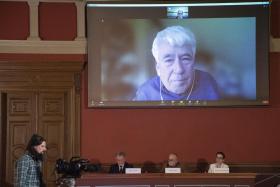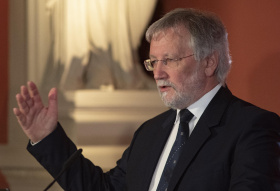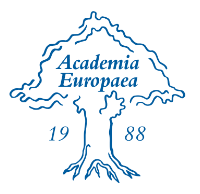News
Science Education Can Build Bridges - a summary of the workshop
Video recording of the event can be watched in full at MTA's YouTube channel
“Methodology of Science Education” is one of the four major themes, termed “thematic missions”, of the AE Budapest Hub. The on-going programme of the Hungarian Academy of Sciences in science education methodology aims to serve as the basis for the development of the activities of the AE Budapest Hub under this thematic mission, which in turn offers the possibility to widen the scope of the programme by incorporating the latest advances in education methodology on a European level. It is hoped that AE Hubs, often hosted by leading European universities themselves, and AE members closely involved in science education, will be keen to contribute to the success of this thematic mission.
The first event in the workshop series launched by the “Methodology of Science Education” thematic mission was held online, in the midst of the pandemic, on March 26, 2021, its title being “Every cloud has a silver lining - experiences and prospects of online STEM education in the light of the pandemic”. The international workshop sought to answer the question of how the pandemic changed public education and the day-to-day running of research, and explored ways in which new methods and tools had been introduced to meet the needs of distance learning.
The second event, held on October 21, 2021, included presentations by Hungarian experts, addressed to a Hungarian audience. Entitled “Recent questions of learning and teaching STEM”, it focused on the perspectives of learning and teaching STEM with a great emphasis on physics and chemistry. A thematic volume dedicated to the scientific content of the workshop was published by the Hungarian scientific journal “Magyar Tudomány” (“Hungarian Science”).
After these two editions came the third – the latest – , on February 20, 2023, bearing the title “Science education can build bridges”, and featuring experts from Finland, Estonia, Germany, and Hungary.
Jari Lavonen, Professor of Physics and Chemistry Education at the Department of Teacher Education, University of Helsinki, Finland, held a talk entitled “Engaging secondary students in physics learning through project-based learning”. In his talk, he explained what is new in the science curriculum in Finland: namely the emphasis on learning of disciplinary core ideas, learning and using scientific and engineering practices, students’ active role in knowledge-building, collaboration between students, and the use of digital tools and media in education. Project-based learning, which is a major building block of the Finnish methodology, focuses on making sense of phenomena or designing solutions to problems. Metacognition is also a key term as students benefit greatly from thinking about their own learning. Social interaction, for its part, plays a fundamental role in the development of cognition. Learning should be contextualized through a driving question, whereby students’ engagement in their own learning process can be elevated to a higher level. As was explained in the talk, in the learning process students are asking questions and planning investigations, then they are carrying out the investigations thus planned, and are finally communicating the outcomes.
Miia Rannikmäe, Professor of Science Education and Head of the Centre for Science Education at the University of Tartu, Estonia, talked in her presentation about “New teaching methodologies in science education”. The talk was based on four recent or on-going projects, in which researchers had been looking for ways to reverse the negative tendency of students’ lacking awareness of science careers and of their ensuing lack of motivation to consider pursuing a scientific career. In order to come up with viable ideas on how to change science teaching, the researchers relied on some policy guidelines which stressed the importance of developing students’ STEM transdisciplinary skills. In addition to thinking skills and research skills, it was also emphasized that students’ communication skills and self-management skills should also be developed in all STEM classes. The implications for science education as identified by the projects were: 1) Make it meaningful; 2) Make it interesting; 3) Make it relevant; 4) Make it attractive; 5) Ensure conceptual learning. Along these lines, the “Contextualisation – Decontextualisation – Recontextualisation” model was developed as a framework for the new teaching method, the gist of which was spelled out in the lecture through practical examples.
 Photo by MTA Kommunikáció/Tamás Szigeti
Photo by MTA Kommunikáció/Tamás SzigetiEckhard Klieme, Professor of Educational Science at Goethe University in Frankfurt am Main and Director of the Department for “Educational Quality and Evaluation“ at the Leibniz Institute for Research and Information in Education (DIPF), Germany gave a lecture entitled “An experimental study on adaptive science education in primary school”. Being a general researcher in educational science rather than a specialist in science education, he focused in his lecture on an in-depth review of the findings of the IGEL (Adaptive science education in primary schools) project of the IDeA Research Center (Center for Research on Individual Development and Adaptive Education for Children at Risk). Generic teaching quality, inquiry-based science education (more specifically guided inquiry) and adaptive teaching were the three areas of educational research which served as a background for the project. Inquiry-based science education works on the assumption that scientific practices used by researchers in their research work should also be the central organizing theme for science teaching and learning in schools. As Eckhard Klieme pointed out, research so far has shown mixed results in terms of the effects of inquiry-based science education. In fact, most researchers agree that guided inquiry is more effective than either traditional, direct instruction or entirely student-directed inquiry. Adaptive teaching, a rather old method dating back to the 1980’s, is meant to fit learners’ individual differences, but in its newer form the method no longer means that each student should end up doing their own work. Building on earlier findings in terms of adaptive teaching, Eckhard Klieme and his collaborators argued in their 2019 study for the creation of a “community of learners” where the strengths of heterogeneous groups are leveraged, thereby helping students’ individual learning. After this introduction of basic ideas, the major part of Professor Klieme’s presentation was dedicated to the description of how this idea was actually put into practice. It was concluded that there was a positive interaction between adaptive practice and generic teaching quality, and that improved generic teaching quality could, in turn, foster student understanding and interest.
 Photo by MTA Kommunikáció/Tamás Szigeti
Photo by MTA Kommunikáció/Tamás SzigetiAs the fourth speaker, Benő Csapó, Professor and Head of the Doctoral School of Education at the University of Szeged, Hungary, delivered a talk entitled “Supporting early science learning with online assessment”. His talk was about the development of an online assessment system for supporting students’ personalized learning, that is, learning adjusted to the needs of the students. Outlining first the scientific background of the assessment frameworks through citing large empirical studies carried out in the past 30 years, Professor Csapó went on to describe the online assessment system (the “eDia Online Assessment System”, containing several thousand items in innovative, multimedia formats) already put in place, and illustrated its actual implementation through a number of examples. Now fully operational, this diagnostic system is currently being integrated into everyday educational practice. Over a thousand partner schools have already joined in using it. Finally, the audience could get a glimpse of what the future practice might hold through data-based personalized intervention: A systematic online support system (automated tutoring system), “eLea”, is now being developed, which will provide personalized online intervention aimed at maximizing the efficacy of science teaching.
The four presentations were followed by a thought-provoking panel discussion moderated by Professor Csapó. The points discussed there have prompted the organizers to sum up the most pressing questions of science education and based on these, to proceed with plans for the next edition of their workshop series:
Questions related to social/contextual aspects:
- How to fight social inequalities in science education?
- The gender issue: how to make girls more attracted to science?
- Involving industry, media and finance into science education support;
- Science education content in non-STEM tertiary education;
Questions related to substantial issues in science education innovation:
- Comprehensive science curriculum in different countries;
- The role of theory, modelling and hands-on experience in STEM in different ages;
- Differences in teaching strategies in physical and life sciences;
- Uses of personal digital tools and the internet in STEM.
For the organization of the fourth edition of the workshop series, the organizers from the AE Budapest Hub would be delighted to rely on the other AE Hubs, as well as AE Membership at large.
To watch the video recording of the workshop, click here.


